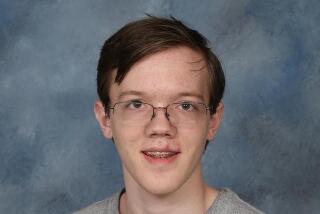Former Serb Leader’s Admission of Guilt Alienates Compatriots
- Share via
BANJA LUKA, Bosnia-Herzegovina — Most ethnic Serbs here largely ignore the ongoing trials of accused Balkan war criminals in The Hague, but they took notice when the former president of the Serb part of Bosnia unexpectedly pleaded guilty to crimes against humanity.
Former President Biljana Plavsic says her admission of guilt for her role in the 1992-1995 Bosnian war is intended to encourage reconciliation. But her sentencing hearing, which begins today and will be the first public discussion of her involvement, seems likely to have the opposite effect in Bosnia.
She is the highest-ranking ethnic Serb to plead guilty before the tribunal.
Bosnia-Herzegovina consists of two parts: Republika Srpska, which is overwhelmingly Serb and whose capital is Banja Luka, and the Muslim-Croat Federation, with its capital in Sarajevo. Plavsic was both a member of the presidency of the self-declared Serb Republic of Bosnia during the war -- an entity that never received international recognition -- and after the war was over, president of Republika Srpska.
Watching her change of heart from afar, Serbs say they feel one of their leaders is betraying them and what they fought for.
“She has nothing to admit guilt to,” said Jelena Mijovic, 22, a Bosnian Serb who is studying Serbian language and literature at Banja Luka University. “She cannot admit guilt to what was the will of the people.”
Mijovic took a long draw on her cigarette and shook her head.
“I’m so disappointed in her. Collectively, as a people, we have pride that doesn’t allow us to go back on what we have done in the past.”
Plavsic has pleaded guilty to a single count of directing a course of conduct by the Bosnian Serb armed forces that aimed to persecute non-Serbs on racial and religious grounds and backed deportation and killing to force them to leave areas of Bosnia where Serbs wanted to live. She can be sentenced to life in prison, but at age 72 is expected to receive a far lighter sentence.
She was originally charged with two counts of genocide and five counts of crimes against humanity, including persecution based on ethnicity, religion and politics.
She is one of just a handful of indicted war criminals charged with genocide.
The Bosnian war was the most brutal European conflict since World War II -- between 100,000 and 200,000 people died and hundreds of thousands more were displaced from their homes.
Although all three Bosnian ethnic groups -- Serbs, Muslims and Croats -- slaughtered one another during the war, the Muslims lost many times more people than either the Serbs or Croats.
Plavsic, a biology professor by training, devoutly Orthodox and anti-Communist, took up the Serb nationalist cause in 1990, joining the party led by Radovan Karadzic, now the most wanted war criminal in the Balkans. When Serbs declared themselves citizens of a separate Bosnian Serb republic, she became a member of its presidency along with Karadzic.
During the time she was in power, the Bosnian Serb army perpetrated some of the most horrifying crimes of the war, including the torture of Muslims in prison camps, the burning of women and children while they were in their homes and mass murders.
Known as “the Empress,” Plavsic was famous for her extreme nationalist and inflammatory rhetoric. She visited the front lines, cheering on soldiers who were, in some cases, waging campaigns of “ethnic cleansing.” She described Muslims as “a genetic defect on the Serbian body.” She also famously said that if the Serbs lost half their population in the fight for Greater Serbia, it would have been worth it.
Although handpicked by Karadzic after the war to succeed him as president of Republika Srpska, she soon distanced herself from him and formed her own political party that worked with the Western powers. She was later defeated by a nationalist candidate.
In 2001, she was indicted by the Hague tribunal and pleaded not guilty. She reversed her plea Oct. 2 of this year.
Beyond their disappointment, Bosnian Serbs reacted to her plea change with scorn and fear for what it might mean for other Serbs already in The Hague or not yet captured.
Under the tribunal’s rules, Plavsic can be required to testify in other cases. When she changed her plea, her lawyer announced that she had made no agreement to do so, but she can be compelled to testify, said Jim Landale, a spokesman for the tribunal.
“Her plea might have consequences in the proceedings against Karadzic, Milosevic and Krajisnik; we think that what she admitted to now may not have to be proved in court in those other cases,” said Dejan Miletic, who heads the Republika Srpska Bureau for Cooperation with The Hague, a government entity that focuses on defending Serb tactics during the war. Momcilo Krajisnik, awaiting trial in The Hague, was a powerful member of the Bosnian Serb government along with Karadzic and Plavsic. Slobodan Milosevic, former president of Serbia and of Yugoslavia, is currently on trial.
People who knew Plavsic say she was a nationalist believer in the Serb cause who convinced herself that she was doing what was in the best interests of the Serb people -- both during the war and afterward, when she distanced herself from Karadzic.
But when she was faced with the prospect of a long trial, forced to confront the atrocities that were done in the name of Bosnian Serb independence, and realized that while she had faded from the public mind, Karadzic was still a beloved figure, she was filled with regret and bitterness, and decided to make a last effort to make an impact, these acquaintances say.
“She was a true believer; at one time she started to think that the Serbian people were endangered in Bosnia if it separated from Yugoslavia ... and certainly she was present when decisions were made, but those decisions never talked specifically about crimes, camps and killings,” said Zeljko Kopanja, editor of Nezavisne Novine, which means Independent Gazette.
“She is a victim of her own misconceptions ... and I think her change is a consequence of her being disappointed in her own destiny,” he said.
But as for helping the reconciliation process, that is doubtful, said Miodrag Zivanovic, a liberal philosophy professor at Banja Luka University.
“Five years ago, I too believed that holding war criminals responsible would help with reconciliation, but now ... I can see that for all this enormous job being done by the tribunal, the effects will be minimal,” Zivanovic said.
More to Read
Sign up for Essential California
The most important California stories and recommendations in your inbox every morning.
You may occasionally receive promotional content from the Los Angeles Times.













